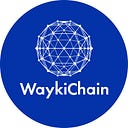WaykiChain Looks Into Future | Blockchain Application Scenarios in Stock Trading
Blockchain gained so much popularity in 2018. The concept stock of blockchain in the stock market became hot as well. So how will blockchain technology change stock trading?
Traditional securities transactions need to be coordinated by the central clearing institutions, banks, securities and exchanges to complete the stock trading, which is low-efficiency and high-cost.
High transaction costs, such as transfer fees and settlement fees, are becoming more and more intolerable. In addition to service charges, the liquidation speed of stock trading is also depressing. For example, after selling your stock, it will take several days before you can withdraw the money even though the money is already transferred to your account.
To solve various problems in the current capital market, major international financial institutions have begun to actively explore blockchain applications, including Nasdaq’s development of blockchain-based securities issuance and transaction management systems; and Australian Securities Exchange’s exploring on updating of securities settlement system using blockchain, etc. Blockchain technology is increasingly being applied to stock trading, and in the near future, its impact on us is roughly as follows.
Transaction is Settlement
High cost and low efficiency have always been the problem of global securities and equity transactions. As a digital, secure and anti-interference distributed ledger, blockchain can effectively solve the problems of current securities clearing and settlement.
Since blockchain technology can bring huge low-cost computing to lots of financial markets, and enable digital assets to be transferred between counterparties of a transaction without any intermediate authorities, global trading and settlement operators has begun to show growing interest in the potential of blockchain technology.
Equity Registration Management
Equity registration is the basic guarantee for the security of securities transactions.
On one hand, registration plays a public role in showing the parties’ equity to the society, allowing potential trading entities to understand the specific ownership status. On the other hand, registration is also a key link in equity trading, recording the transfer of equity owners.
Blockchain is an ideal solution for storing permanent records. With the characteristics of safety, transparency, irreversibility and traceability, blockchain ledger has an obvious advantage in recording company shareholdings and its change history.
Transfer of Equity
The traditional over-the-counter (OTC) equity transaction is based on the credit of both parties, and credit risks exposed to both parties are borne by themselves. The bilateral credit is required to conduct a transaction, and the trading platform mainly takes the credit risk of the market trader.
With blockchain technology, the ownership of an equity is registered in the blockchain, and the equity transaction must be signed by the owner’s private key to be verified. After the transaction is confirmed, the change of the equity will also be recorded in the blockchain, thus ensuring the interests of both parties.
Smart Contract and Equity Crowdfunding
In the initial stage of equity crowdfunding, initiators, crowdfunding platforms, lead investors, sponsors and other parties jointly sign a crowdfunding contract to stipulate their respective responsibilities and obligations. This contract can be stored in the blockchain in the form of smart contract using blockchain technology. The blockchain ensures that the contract cannot be tampered with during execution.
Website: https://www.waykichain.com/
Telegram: https://t.me/wiccofficial
Twitter: https://twitter.com/wayki_chain
Facebook: https://www.facebook.com/waykichainofficial/
CMC: https://coinmarketcap.com/currencies/waykichain/
Email: WaykiChain@outlook.com
